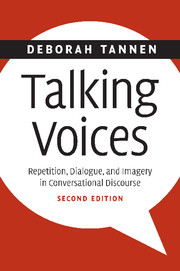Book contents
- Frontmatter
- Contents
- Acknowledgments
- 1 Introduction to first edition
- Introduction to second edition
- 2 Involvement in discourse
- 3 Repetition in conversation: toward a poetics of talk
- 4 “Oh talking voice that is so sweet”: constructing dialogue in conversation
- 5 Imagining worlds: imagery and detail in conversation and other genres
- 6 Involvement strategies in consort: literary nonfiction and political oratory
- 7 Afterword: toward a humanistic linguistics
- Appendix I: Sources of examples
- Appendix II: Transcription conventions
- Notes
- List of references
- Author index
- Subject index
1 - Introduction to first edition
Published online by Cambridge University Press: 23 December 2009
- Frontmatter
- Contents
- Acknowledgments
- 1 Introduction to first edition
- Introduction to second edition
- 2 Involvement in discourse
- 3 Repetition in conversation: toward a poetics of talk
- 4 “Oh talking voice that is so sweet”: constructing dialogue in conversation
- 5 Imagining worlds: imagery and detail in conversation and other genres
- 6 Involvement strategies in consort: literary nonfiction and political oratory
- 7 Afterword: toward a humanistic linguistics
- Appendix I: Sources of examples
- Appendix II: Transcription conventions
- Notes
- List of references
- Author index
- Subject index
Summary
The central idea of this book is that ordinary conversation is made up of linguistic strategies that have been thought quintessentially literary. These strategies, which are shaped and elaborated in literary discourse, are pervasive, spontaneous, and functional in ordinary conversation. I call them “involvement strategies” because, I argue, they reflect and simultaneously create interpersonal involvement.
The field of literary scholarship has examined in depth the language of literary discourse. An understanding of the language of everyday conversation is needed as a basis for that, as well as for linguistic scholarship. Although the analysis of conversation is a burgeoning field, for the most part it has been carried out by sociologists and anthropologists more interested in social and cultural processes than in language per se. Without devaluing this rich and enriching body of research, much of which is cited in this book, I believe there is plenty of room in the field of conversation analysis for linguists to join in, and a need for the special attention to and knowledge about language which linguists are trained to bring to their subject.
Overview of chapters
The core of analysis in this book is to be found in chapters 3 through 5. Each of these chapters is devoted to exploring a single involvement strategy. Chapter 3 is about repetition, with particular emphasis on the repetition of words and phrases in multi-party casual conversation.
Information
- Type
- Chapter
- Information
- Talking VoicesRepetition, Dialogue, and Imagery in Conversational Discourse, pp. 1 - 7Publisher: Cambridge University PressPrint publication year: 2007
